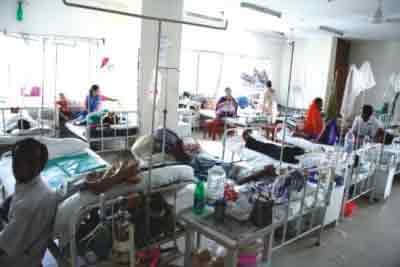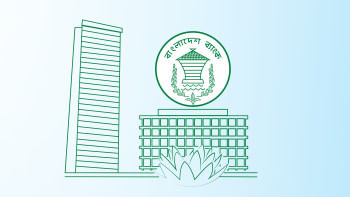Where are the basic health services?

I have been visiting some upazilla and union health care centres during last two months and was touched by the simple needs that are not met.
I went to a community clinic at 9:45 am. It was locked, but no one was surprised. For them it was not even the time to start. "He will come soon," said the people around the centre. The land donor came from his house and said: "If you want I can call him by mobile phone." We said: "No it is alright. We just want to know how you get the services." They were relieved. "Oh yes, we get many services. There are lots of medicines here. Even the pregnant women come here for check up." We said: "But there are no female health providers," "No, no, he can do everything. He at least checks their weight, blood pressure etc." they said.
It is hard to judge from these statements about the quality of service. But the people were protective of the community clinic. They said: "How can one provide services in such a situation? You see the building is made in such a way that one cannot even stand outside if it rains. There is no shade. The latrine and tubewell are out of order, but no money to repair them. Can you believe, the government has money for construction of the building, but there is not even a broom to sweep the rooms? It is always dirty. The person who comes here from the morning does not have any allocation for refreshments. How can he work for so long without having anything to eat?"
We went to a Union Health and Family Welfare Centre (UHFWC). The signboard is small, but there is a big message written on the building: Atharor age biye noy, bisher age sontan noy (no marriage before 18, no children before 20). The building is nice with some empty residential facilities. We went there right after 2 pm. It was closed. Only cows and goats were seen in the premise. Another union health centre, called Family Welfare Centre (FWC), is now in appalling condition. A corner of the ceiling is full of holes and may break anytime. The operation theatre and the labour room were closed.
At one UHFWC, we found patients as well as the service providers. It was very good to see few women waiting for services and others talking with the sub-assistant medical officer. There was no electricity. She said: "The electricity comes and goes quite frequently, so I have kept the switch on so that I know when the electricity comes." She seemed confident, and had a good rapport with the women who came for services. In response to our question on services she said: ""We have to be tactical. This is actually a family planning centre, but patients come for different health problems, we cannot let them go back empty handed. So we give them at least some tablets." As she said: "Keel o firan lage, chikitsha o deya lage" (we have to avoid the kicks from the unsatisfied users as well as give treatment). The high officials only want the target of contraceptive distribution to be fulfilled. At least for simple health problems they can give some medicine. They must respond to the people's problem.
Lack of medicine, personnel and proper equipment is perhaps one of the reasons why the union health centres are not open for longer time. They are supposed to open at 8 am and close at 2 pm. But they don't open till 10 am and close by 1 pm. Sometimes they remain open for only an hour. People call Them: "Ek ghontar haspatal" (one-hour hospital). I must say, those who are running the UHFWC are trying hard to provide the services to people.
An upazilla health centre (UHC) can be as far as 10 to 14 kilometers from a village. Road communication may not be so easy. For CNG auto rickshaws or cycle vans the cost is about Tk.200 to Tk.300 one way. We have seen people carrying patients in bamboo carriers. UHCs are often located on the main roads of upazilla headquarters. At one UHC, the approach is impressive. It is a well-established facility with two-storey concrete building with enough space inside and outside. There is an ambulance, but it is not used. Why? The answer is: "No allocation for fuel." We have been to some UHCs during office hours. There were many patients for the OPD and in front of the dispensary. In some UHCs, we went after 2 pm, where the OPD service was not open but the emergency section was open with a doctor present.
In the indoor facilities we saw children with cough, cold and fever, patients with burn injuries etc. The nurses are there, however the attendants take care of their respective patients. That's why, in the female ward there were men around the female patients' bed, and in the male ward there were women around the male patients' beds. This was causing uneasiness among female patients. Anyway, the cleanliness of the hospital is a big issue.
To improve the quality of the health services some basic allocations are needed. Undoubtedly, people prefer to go to the government hospitals but get disappointed because of simple problems.
The budget (2012-2013) for health is Tk.9355 crore, giving priority to maternal, neonatal, child and adolescent health; community health care initiative; family planning field service delivery, and national nutrition service. This is only 4.7% of the total budget allocation, one of the lowest allocations in the budget in the last decade. Despite demands from health groups for an increase in the budget, nothing has happened. The low budget will not be able to cover the required costs for providing basic services.
If we go through the Health and Family Welfare section of the budget speech (Section 114 to 122), it talks about setting up community clinics (which is not enough to ensure service delivery to the people), building up stocks of contraceptives ( but no plan to strengthen the service delivery of family planning to make it safe for women), manpower and infrastructure development (recruitments are there but no efforts to make them stay in the rural areas where they are most needed), and ICT services for health (not clear who will actually do it).
I feel we need a budget to provide basic services. Unfortunately, the budget allocation fails to see the simple need.

 For all latest news, follow The Daily Star's Google News channel.
For all latest news, follow The Daily Star's Google News channel. 



Comments